Home is where the haunt is: The Shining‘s hauntology
Mon. January 23, 2006Categories: Abstract Dynamics
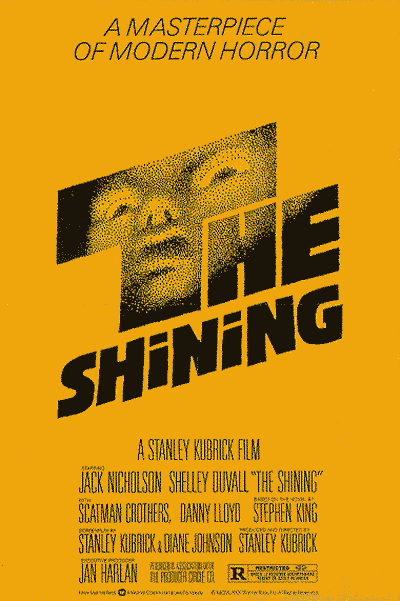
1. The sound of hauntology
Conjecture: hauntology has an intrinsically sonic dimension.
The pun hauntology, ontology – works in spoken French, after all. In terms of sound, hauntology is a question of hearing what is not here, the recorded voice, the voice no longer the guarantor of presence (Ian P: ‘Where does the Singer’s voice GO, when it is erased from the dub track?’) Not phonocentrism but phonography, sound coming to occupy the dis-place of writing.
Nothing here but us recordings…
2. Ghosts of the Real
Derrida’s neologism uncovers the space between Being and Nothingness.
The Shining – in both book and film versions, and here I suggest a side-stepping of the wearisome struggle between King fans and Kubrickians and propose treating the novel and the film as a labyrinth-rhizome, a set of interlocking correspondences and differences, a row of doors is about what lurks, unquiet, in that space. Insofar as they continue to frighten us once we’ve left the cinema, the ghosts that dwell here are not supernatural. As with Vertigo, in The Shining it is only when the possibility of supernatural spooks has been laid to rest that we can confront the Real ghosts…. or the ghosts of the Real.
3. The haunted ballroom
Mark Sinker: ‘ALL [Kubrick’s] films are fantastically “listenable” (if you use this in sorta the same sense you use watchable)’
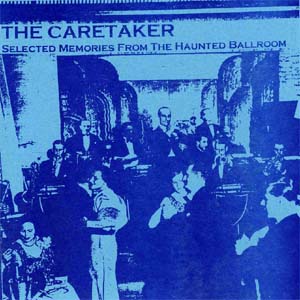
Where does
The conceit of The Caretaker’s Memories from the Haunted Ballroom has the simplicity of genius: a whole album’s worth of songs that you might have heard playing in the Gold Room in The Shining‘s Overlook Hotel. Memories from the Haunted Ballroom is a series of soft-focus delirial-oneiric versions of Twenties and Thirties tearoom pop tunes, the original numbers drenched in so much reverb that they have dissolved into a suggestive audio-fog, the songs all the more evocative now that they have been reduced to hints of themselves. Thus Al Bowlly’s ‘It’s All Forgotten Now’, for instance, one of the tracks actually used by Kubrick on The Shining soundtrack, is slurred down, faded in and out, as if it is being heard in the ethereal wireless of the dreaming mind or played on the winding-down gramophone of memory. As I.P. wrote of dub: ‘It makes of the Voice not a self-possession but a dispossession – a “re” possession by the studio, detoured through the hidden circuits of the recording console.’
the singer’s voice
GO?
4. In the Gold Room
Jameson: ‘it is by the twenties that the hero is haunted and possessed…’
Kubrick’s editing of the film does not allow any of the polyvalencies of that phrase, ‘It’s All Forgotten Now’, to go un(re)marked. The uncanniness of the song, today and twenty-five years ago when the film was released, arises from the (false but unavoidable) impression that it is commenting on itself and its period, as if were an example of the way in which that era of beautiful and damned decadence and Gatsby glamour were painfully, delightfully aware of its own butterfly’s wing evanescence and fragility. Simultaneously, the song’s place in the film it plays in the background as a bewildered Jack speaks to Grady in the bathroom about the fact that Grady has killed himself after brutally murdering his children indicates that what is forgotten may also be preserved: through the mechanism of repression.
I don’t have any recollection of that at all.
Why does this Gold Room Pop, all those moonlight serenades and summer romances, have such power? The Caretaker’s spectralized versions of those lost tunes only intensifies something that Kubrick, like Dennis Potter, had identified in the pop of the Twenties and Thirties. I’ve tried to write before about the peculiar aching quality of these songs that are melancholy even at their most ostensibly joyful, forever condemned to stand in for states that they can evoke but never instantiate.
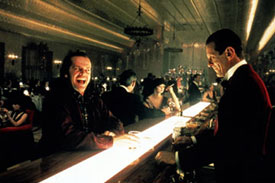
For Fredric Jameson, the Gold Room revels bespeak a nostalgia for ‘the last moment in which a genuine American leisure class led an aggressive and ostentatious public existence, in which an American ruling class projected a class-conscious and unapologetic image of itself and enjoyed its privileges without guilt, openly and armed with its emblems of top-hat and champagne glass, on the social stage in full view of the other classes’. But the significance of this genteel, conspicuous hedonism must be construed psychoanalytically as well as merely historically. The ‘past’ here is not an actual historical period so much as a fantasmatic past, a Time that can only ever be retrospectively retrospectrally – posited. The ‘haunted ballroom’ functions in Jack’s libidinal echonomy (to borrow a neologism from Irigaray) as the place of belonging in which, impossibly, the demands of both the paternal and the maternal superegos can be met, the honeyed, dreamy utopia where doing his duty would be equivalent to enjoying himself…. Thus, after his conversations with bartender Lloyd and waiter Grady (Jack’s frustrations finding a blandly indulgent blank mirror sounding board in the former and a patrician, patriarchal voice in the latter), Jack comes to believe that he would be failing in his duty as a man and a father if he didn’t succumb to his desire to kill his wife and child.
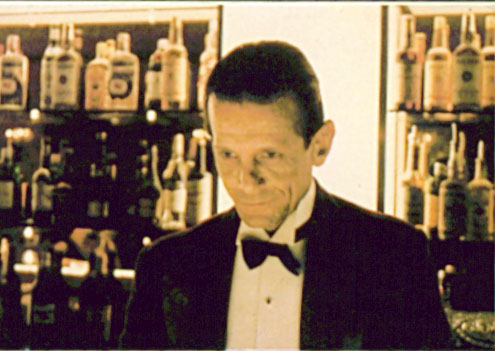
White man’s burden, Lloyd…. white man’s burden….
If the Gold Room seems to be a male space (it’s no accident that the conversation with Grady takes place in the men’s room), the place in which Jack – via male intermediaries, intercessors working on behalf of the hotel management, the house, the house that pays for his drinks – faces up to his ‘man’s burdens’, it is also the space in which he can succumb to the injunction of the maternal super-ego: ‘Enjoy’.
Michel Ciment: ‘When Jack arrives at the Overlook, he describes this sensation of familiarity, of well-being (“It’s very homey”), he would “like to stay here forever”, he confesses even to having “never been this happy, or comfortable anywhere”, refers to a sense of dèja vu and has the feeling that he has “been here before”. “When someone dreams of a locality or a landscape,” according to Freud, “and while dreaming thinks “I know this, I’ve been here before”, one is authorized to interpret that place as substituting for the genital organs and the maternal body.”‘
5. Patriarchy/hauntology
Isn’t Freud`s thesis first advanced in Totem and Taboo and then repeated, with a difference, in Moses and Monotheism, simply this: patriarchy is a hauntology? The father whether the the obscene Alpha Ape Pere-Jouissance of Totem and Taboo or the severe, forbidding patriarch of Moses and Monotheism – is inherently spectral. In both cases, the Father is murdered by his resentful children who want to re-take Eden and access total enjoyment. Their father’s blood on their hands, the children discover, too late, that total enjoyment is not possible. Now stricken by guilt, they find that the dead Father survives in the mortification of their own flesh, and in the introjected voice which demands its deadening.
6. A History of Violence
Ciment: ‘The camera itself — with its forward, lateral and reverse tracking shots … following a rigorously geometric circuit — adds further to the sense of implacable logic and an almost mathematical progression.’
Even before he enters the Overlook, Jack is fleeing his ghosts. And the horror, the absolute horror, is that he haunter and the hunted – flees to the place where they are waiting. Such is The Shining‘s pitiless fatality (and the novel is if anything even more brutal in its diagramming of the network of cause-and-effect, the awful Necessity, the ‘generalized determinism’, of Jack’s plight than the film).
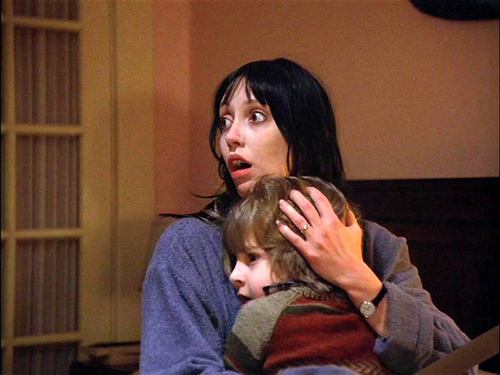
Jack has a history of violence. (And as I have written before, The Shining in many ways doubles Cronenberg’s film of that name from last year. More of that parallel below.) In both novel and film of The Shining, the Torrance family is haunted by the prospect that Jack will hurt Danny…. again. Jack has already snapped, drunkenly attacked Danny. An abberation, a miscalculation, ‘a momentary loss of muscular coordination. A few extra foot-pounds of energy per second, per second’: so Jack tries to convince Wendy, and Wendy tries to convince herself. The novel tells us more. How has it come to this, that a proud man, an educated man, like Jack, is reduced to sitting there, false, greasy grin plastered all over his face, sucking up everything that a smarmy corporate non-entity like Stuart Ulman serves up? Why, because he has been sacked from his teaching job for attacking a pupil, of course. That is why Jack’s will accept, and be glad of, Ulman’s menial job in Overlook.
The history of violence goes back even further. One of the things missing from the film but dealt with at some length in the novel is the account of Jack’s relationship with his father. It’s another version of patriarchy’s occult history, now not so secret: abuse begetting abuse. Jack is to Danny as Jack was to his father. And Danny will be to his child….?
The violence has been passed on, like a virus. It’s there inside Jack, like a photograph waiting to develop, a recording ready to be played.
Refrain, refrain…
7. Home is where the haunt is
The word ‘haunt’ and all the derivations thereof may be one of the closest English word to the German ‘unheimlich’, whose polysemic connotations and etymological echoes Freud so assiduously, and so famously, unraveled in his essay on ‘The Uncanny’. Just as ‘German usage allows the familiar (das Heimliche, the’ homely’) to switch to its opposite, the uncanny (das Unheimliche, the ‘unhomely’)’ (Freud), so ‘haunt’ signifies both the dwelling-place, the domestic scene and that which invades or disturbs it. The OED lists one of the earliest meanings of the word ‘haunt’ as ‘to provide with a home, house.’
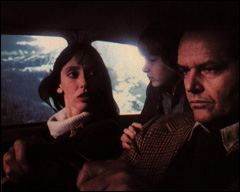
Fittingly, then, the best interpretations of The Shining position it between melodrama and horror, much as Cronenberg’s History of Violence is positioned between melodrama and the action film. In both cases, the worst Things, the real Horror, is already Inside…. (and what could be worse than that?)
You would never hurt Mommie or me, would ya?
8. The house always wins
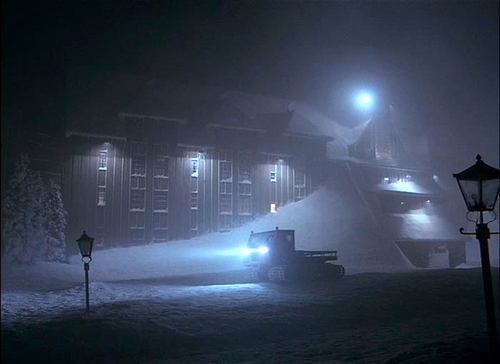
What horrors does the big, looming house present? For the women of Horrodrama, it has threatened non-Being, either because the woman will be unable to differentiate herself from the domestic space or because – as in Rebecca (itself an echo of Jane Eyre) – she will be unable to take the place of a spectral-predecessor. Either way, she has no access to the proper name. Jack’s curse, on the other hand, is that he is nothing but the carrier of the patronym, and everything he does always will have been the case.
I’m sorry to differ with you, sir. But you are the caretaker. You’ve always been the caretaker. I should know, sir. I’ve always been here.
9.I’m right behind you Danny
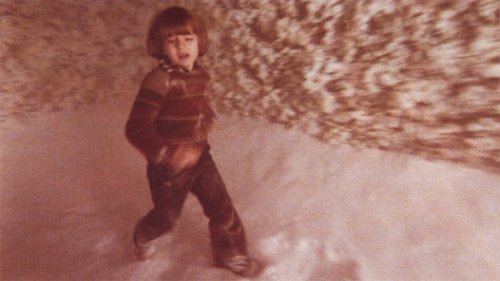
Metz: ‘When Jack chases Danny into the maze with ax in hand and states, “I`m right behind you Danny”, he is predicting Danny`s future as well as trying to scare the boy.’
Predicting Danny`s future Jack might be, but that is why he could equally well say ‘I’m just ahead of you Danny…’ Danny may physically have escaped Jack, but psychically….? The Shining leaves us with the awful suspicion that Danny may become (his) Daddy, that the damage has already been done (had already been done even before he was born), that the photograph has been taken, the recording made; all that is left is the moment of development, of playing back.
Unmask!
(And how does Danny escape from Jack? By walking backwards in his father’s footsteps).
10. The No Time of trauma
Jack: Mr. Grady. You were the caretaker here. I recognize ya. I saw your picture in the newspapers. You, uh, chopped your wife and daughters up into little bits. And then you blew your brains out.
Grady: That’s strange, sir. I don’t have any recollection of that at all.
What is the time when Jack meets Grady?
It seems that the murder — and suicide — has already happened, Grady tells Jack that he had to correct his daughters. Yet — not surprisingly — Grady has no memory
Bowlly’s ‘It’s All Forgotten Now’ wafting in the background
of any such events.
‘I don’t have any recollection of that at all.’
(And you think, well, it’s not the sort of thing that you’d forget, killing yourself and your children, is it? But of course, it’s not the sort of thing that you could possibly remember. It is an exemplary case of that which must be repressed, the traumatic Real.)
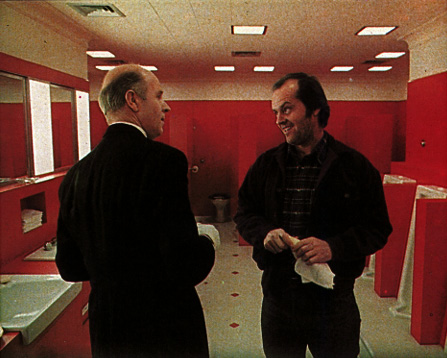
Jack: Mr. Grady. You were the caretaker here.
Grady: I’m sorry to differ with you, sir. But you are the caretaker. You’ve always been the caretaker. I should know, sir. I’ve always been here.
11. Overlooked
Overlook:
To look over or at from a higher place.
To fail to notice or consider; miss.